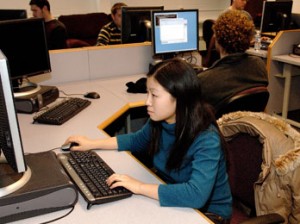Aiming to engage students who are multitasking with different forms of technology, companies are creating collaborative learning spaces online where students can help one another solve homework problems and study—all while building important 21st-century skills.
One such social-networking study site is Grockit, which currently offers test-prep services and is expanding its focus to include math and English for students in grades 8-12, with history and science soon to follow. Grockit has opened enrollment for a free Summer Enrichment Academy, which is designed to keep students from falling behind during summer vacation as they participate in collaborative group study forums online.
Grockit’s appeal lies not only in the fact that academic support from peers is free, but also because students are motivated to learn through the company’s social-networking and gaming platform, said Grockit CEO Farb Nivi. As online social networking becomes a ubiquitous aspect of youth culture, sites such as Grockit could represent the future of education technology.
“We have a social responsibility to create technology and tools that can help kids leverage other students,” Nivi said. “Other than the initial investment you make in technology or a tool, you don’t really have to spend any more to get more learning. Having teachers around costs money. But students can help each other just as much, or more, and they can do it for free.”
With Grockit, students can practice with, learn from, and compete with millions of their peers on the subject of their choice using live chat services. Students also can earn points and recognition for their achievements, including how helpful they are to their peers; their status is shown to the Grockit community, which can motivate students to excel even further.
Florida Virtual School (FLVS) completed an initial pilot of Grockit’s platform with FLVS’s own content for Algebra I students and eight teachers, and the online school now will expand the pilot to incorporate some of Grockit’s content.
“The social gaming dynamic is really what interested me,” said Jeramy Gatza, an FLVS innovation manager on the curriculum research and discovery team. Gatza’s team identifies new and emerging technologies and explores those technologies to see whether they might benefit FLVS students.
“Because of that social factor, the power in it isn’t just answering a question—it’s that positive peer influence on learning,” Gatza said.
Gatza said he and his team noticed that students who used the Grockit study spaces had a higher tendency to come back and collaborate further with peers.
“It’s not just about technology; it’s about learning and students,” Gatza said. “Kids are different now than they were 13 years ago, [when FLVS launched]. Society evolves.”
Logging onto Grockit just a few hours a week during the summer can help students bridge the gap between school years, so that come September they are ready to build upon last school year’s lessons with little review, Nivi said.
Nivi said estimates point to a 25 to 27 percent learning loss during summer vacation. And Grockit’s social networking structure ensures that students will always find peers to collaborate and learn with online.
“If you look at our SAT networks, there is live group collaboration occurring almost 24 hours a day,” Nivi said. “The K-12 market is 65 million people, the SAT market is 1 million people,” so students are likely to find help when they need it, he said.
Collaborative learning and group study on the site is free, and parents can pay $79 for additional information and data specific to their child. The program uses the same IRT algorithms as actual standardized tests to adapt instruction to each individual student’s strengths and weaknesses.
Online study sites that encourage student collaboration are gaining in popularity as more students enroll in full-time or supplemental online courses. Another such site is ePals, which provides a safe online platform for teachers and students to share information and work together on projects.
Examining these sites from an education perspective and a gaming perspective provides valuable insight into the trend.
“From the education side, we see that there’s so much power in platforms [that are similar to] Facebook, [in] being able to not only reach the user in a platform that’s engaging but that reaches into all aspects of life,” Gatza said. “Facebook [is] really the space where the students ‘are,’ and engaging in those areas is definitely the right place to go, because they bring the students in and make learning more powerful.”
The gaming aspect attracts students as well, he added.
“Being able to know that a student can participate in this fun, competitive environment with very low risk” is appealing, Gatza said. “I feel that gaming in general has a positive impact, as long as it’s applied in the right way. Social games have a lot more power, because they allow people to connect to one another and solve things collaboratively.”
He added: “At the core, they’ve made studying for tests a fun social activity. It’s not about getting a right answer—it’s about being able to help each other.”
Links:
